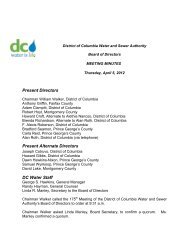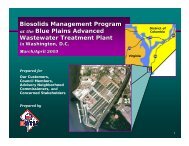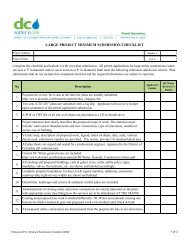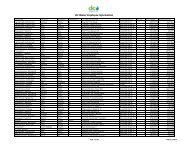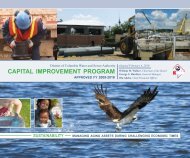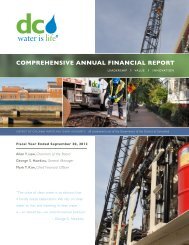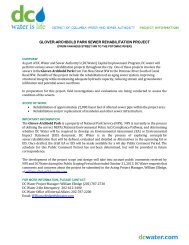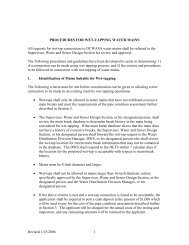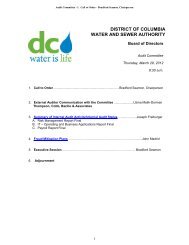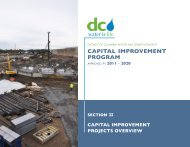Hist and Proj Operating Receipts FY 2011 2 17 2010 - DC Water
Hist and Proj Operating Receipts FY 2011 2 17 2010 - DC Water
Hist and Proj Operating Receipts FY 2011 2 17 2010 - DC Water
You also want an ePaper? Increase the reach of your titles
YUMPU automatically turns print PDFs into web optimized ePapers that Google loves.
<strong>FY</strong> 2009. The commercial paper program will be increased to over $100 million in <strong>FY</strong> <strong>2011</strong>. A description of the assumptions <strong>and</strong><br />
major issues in each major expenditure category follows.<br />
. Personnel service expenditures are $0.3 million, or 0.3 percent below the approved <strong>FY</strong> <strong>2010</strong> budget. This decrease is<br />
attributable to lower vacancy rates as filled positions have increased in recent years. Fringe benefits were adjusted based on<br />
current market rates.<br />
. Contractual service expenditures increase by $O.t million, or 0.1 percent, overthe approved <strong>FY</strong> <strong>2010</strong> budget due primarily to<br />
funding for various contractual services throughout the organization. Funding was also added to improve water main<br />
infrastructure repair/replacement needs <strong>and</strong> for professional services to maximize our new business processes, such as<br />
MAXIMO.<br />
. <strong>Water</strong>purchaseexpenditures increase by $0.9 million or3.1 percent overthe approved <strong>FY</strong> <strong>2010</strong> budget. This directly relates<br />
to operating cost increases for the Washington Aqueduct's budget.<br />
. Chemicals <strong>and</strong> supplies expenditures increase by $0.0S million, or 1.1 percent, from the approved <strong>FY</strong> <strong>2010</strong> budget.<br />
. Utilities expenditures decrease by $+.2 million, or 11.2 percent, primarily due to lower anticipated electricity costs. Electricity,<br />
budgeted at $29.3 million, or 11 percent of the revised <strong>FY</strong> <strong>2010</strong> budget, continues to be the largest portion of the Authority's<br />
utilities budget. Electricity prices have been extremely volatile for the past several years, due to rising oil prices, heavy global<br />
dem<strong>and</strong> for power <strong>and</strong> oil, <strong>and</strong> the after effects of Hurricanes Katrina <strong>and</strong> Rita in <strong>FY</strong> 2005. We continue to utilize the five-year<br />
electricity contract entered in <strong>FY</strong> 2005 for electricity generation. ln <strong>FY</strong> 2009, <strong>DC</strong> WASA was successful in purchasing its<br />
electricity for an average cost of $95.52 per megawatt hour compared to an estimated average cost of $142.3 per megawatt hour<br />
had <strong>DC</strong> WASA acquired its electricity through the PEPCO St<strong>and</strong>ard Offer Service (SOS). This represented an estimated savings<br />
of $13.1 million in <strong>FY</strong> 2009. We continue to mitigate the Authority's exposure from higher energy prices that occur during peak<br />
dem<strong>and</strong> periods by periodically locking in portions of our electricity load, especially for the summer <strong>and</strong> winter periods. Working<br />
with our electric energy service company, we continue to monitor the electricity market on a continuing basis <strong>and</strong> explore<br />
alternatives that could yield additional cost savings. ln <strong>FY</strong> <strong>2011</strong>, we will lock the majority of our electricity load; thus reducing<br />
potential budget exposure by $S million.<br />
<strong>DC</strong> WASA continues its environmental stewardship implementing environmentally responsive <strong>and</strong> responsible polices <strong>and</strong> programs.<br />
These actions protect the region's waterways, air, <strong>and</strong> l<strong>and</strong>. ln <strong>FY</strong> 2009, <strong>DC</strong>WASA established a Carbon Footprint Steering<br />
Committee <strong>and</strong> an Energy Steering Team each led by the Energy Manager. The Carbon Footprint Steering Committee was<br />
established to formulate <strong>and</strong> provide guidance for the Authority's carbon footprint (greenhouse gases) inventory <strong>and</strong> reduction<br />
objectives <strong>and</strong> to serve as a resource in evaluating opportunities <strong>and</strong> challenges associated with evolving federal <strong>and</strong> regional<br />
carbon footprint legislation <strong>and</strong> regulation. At the end of <strong>FY</strong> 2009, <strong>DC</strong> WASA has completed its carbon footprint inventory as a part of<br />
tv -27



